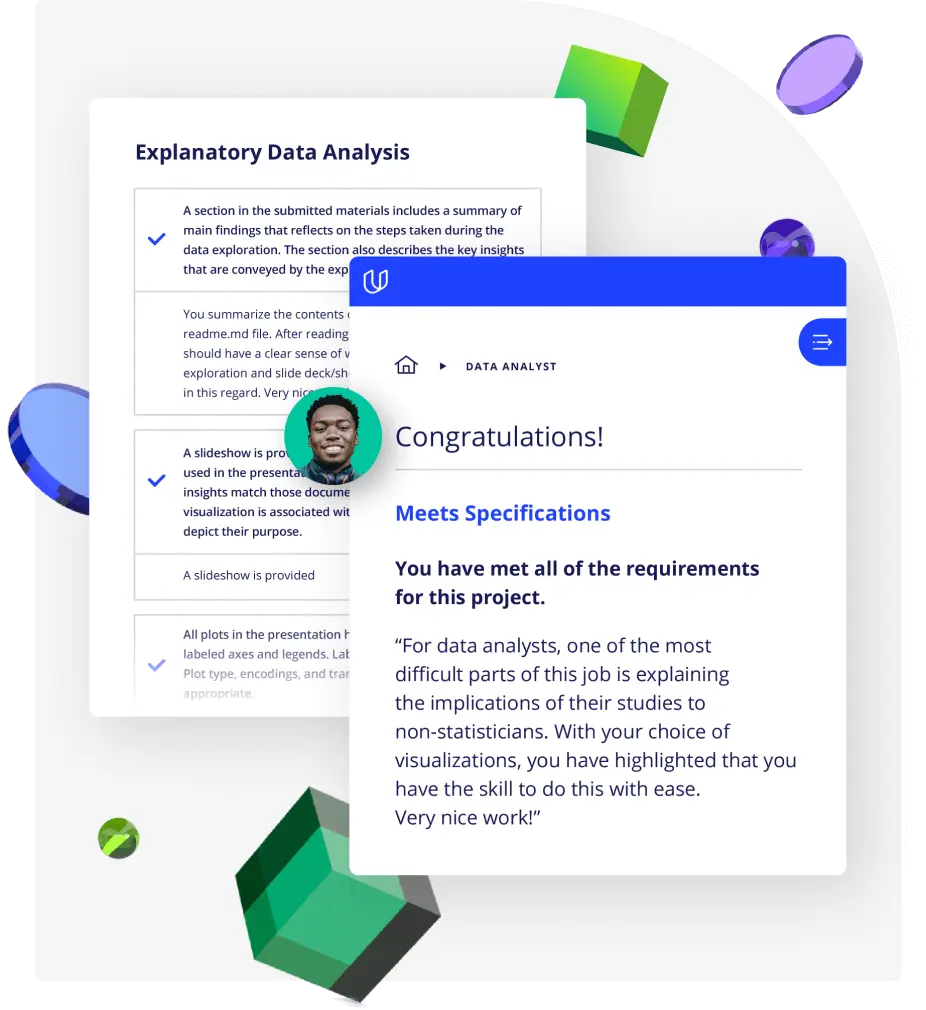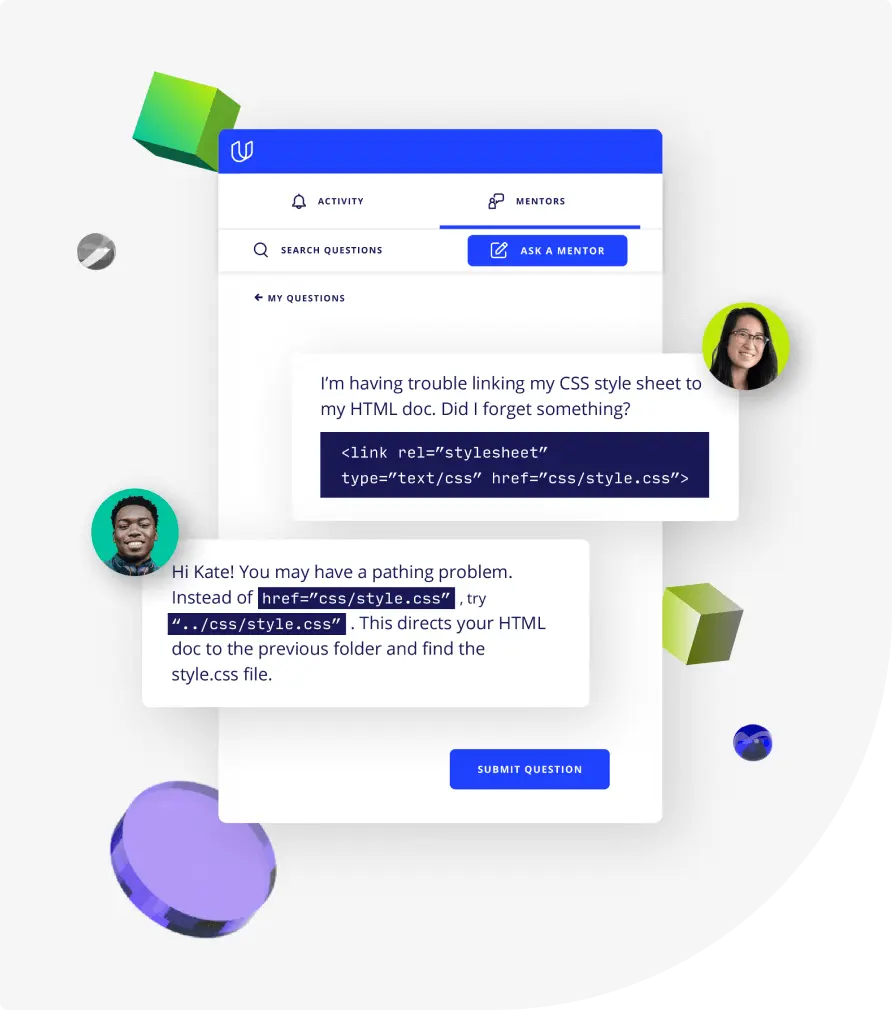Lesson 1
An Introduction to Your Nanodegree Program
Welcome! We're so glad you're here. Join us in learning a bit more about what to expect and ways to succeed.

Nanodegree Program
Get hands-on experience running data pipelines, designing experiments, building recommendation systems, and more.
Get hands-on experience running data pipelines, designing experiments, building recommendation systems, and more.
Built in collaboration with
IBM
Advanced
4 months
Real-world Projects
Completion Certificate
Last Updated May 31, 2024
Skills you'll learn:
Prerequisites:
Course 1 • 1 hour
Lesson 1
Welcome! We're so glad you're here. Join us in learning a bit more about what to expect and ways to succeed.
Lesson 2
You are starting a challenging but rewarding journey! Take 5 minutes to read how to get help with projects and content.
Lesson 3
Course 2 • 3 weeks
Learn the data science process, including how to build effective data visualizations, and how to communicate with various stakeholders.
Lesson 1
This lesson will give you an overview of the course, discuss pre-requisites and stakeholders.
Lesson 2
In this lesson, you will learn about CRISP-DM and how you can apply it to many data science problems.
Lesson 3
In this lesson, you will be creating a post to communicate your findings via Medium.
Lesson 4 • Project
In this project, you will create a blog post and Github repository that you can use as you build your data science portfolio.
Course 3 • 18 hours
Software engineering skills are increasingly important for data scientists. In this course, you'll learn best practices for writing software. Then you'll work on your software skills by coding a Python package and a web data dashboard.
Lesson 1
Welcome to Software Engineering for Data Scientists! Learn about the course and meet your instructors.
Lesson 2
Learn software engineering practices and how they apply in data science. Part one covers clean and modular code, code efficiency, refactoring, documentation, and version control.
Lesson 3
Learn software engineering practices and how they apply in data science. Part two covers testing code, logging, and conducting code reviews.
Lesson 4
Learn the basics of object-oriented programming so that you can build your own Python package.
Lesson 5
Create your own Python package and upload your package to PyPi.
Lesson 6
Develop a data dashboard using Flask, Bootstrap, Plotly and Pandas.
Lesson 7
Customize the data dashboard from the previous lesson to make it your own. Upload the dashboard to the web.
Course 4 • 1 month
In data engineering for data scientists, you will practice building ETL, NLP, and machine learning pipelines. This will prepare you for the project with our industry partner Figure 8.
Lesson 1
You will get an introduction to the data engineering for data scientists course and project. The lessons include ETL pipelines, natural language pipelines, and machine learning pipelines.
Lesson 2
ETL stands for extract, transform, and load. This is the most common type of data pipeline, and you will practice each step in this lesson.
Lesson 3
In order to complete the project at the end of the course, you will need some natural language processing skills. Here you will practice engineering machine learning features from text data.
Lesson 4
You'll use the Scikit-Learn package to code a machine learning pipeline. With these skills, you can ingest data, create features, and train a machine learning algorithm in just one step.
Lesson 5 • Project
You’ll build a machine learning pipeline to categorize emergency messages based on the needs communicated by the sender.

Staff Data Scientist
Josh has been sharing his passion for data for over a decade. He's used data science for work ranging from cancer research to process automation. He recently has found a passion for solving data science problems within marketplace companies.

Data Analyst Instructor
Mike is a content developer with a multidisciplinary academic background, including math, statistics, physics, and psychology. Previously, he worked on Udacity's Data Analyst Nanodegree program as a support lead.

Senior Data Engineer at Netflix
Judit is a Senior Data Engineer at Netflix. Formerly a Data Engineer at Split, where she worked on the statistical engine of their full-stack experimentation platform, she has also been an instructor at Insight Data Science, helping software engineers and academic coders transition to DE roles.

VP of Engineering at Insight
David is VP of Engineering at Insight where he enjoys breaking down difficult concepts and helping others learn data engineering. David has a PhD in Physics from UC Riverside.

Instructor
Andrew has an engineering degree from Yale, and has used his data science skills to build a jewelry business from the ground up. He has additionally created courses for Udacity's Self-Driving Car Engineer Nanodegree program.

Instructor
As a data scientist at Looplist, Juno built neural networks to analyze and categorize product images, a recommendation system to personalize shopping experiences for each user, and tools to generate insight into user behavior.

Instructor
Luis was formerly a Machine Learning Engineer at Google. He holds a PhD in mathematics from the University of Michigan, and a Postdoctoral Fellowship at the University of Quebec at Montreal.
Average Rating: 4.8 Stars
781 Reviews
Dattaji K.
January 27, 2023
Going good although a bit slow due to time constraints.
Maxim K.
January 25, 2023
Small bugs, but the content and the tasks are really great for the job preparation!
Saad A.
January 10, 2023
great start
Nihal K.
December 28, 2022
Just Brilliant.
Kerim Kutluhan T.
December 15, 2022
It is definitely more challenging than any coursera course I have taken related to the subject and therefore I believe I am learning more. thank you
Combine technology training for employees with industry experts, mentors, and projects, for critical thinking that pushes innovation. Our proven upskilling system goes after success—relentlessly.

Demonstrate proficiency with practical projects
Projects are based on real-world scenarios and challenges, allowing you to apply the skills you learn to practical situations, while giving you real hands-on experience.
Gain proven experience
Retain knowledge longer
Apply new skills immediately

Top-tier services to ensure learner success
Reviewers provide timely and constructive feedback on your project submissions, highlighting areas of improvement and offering practical tips to enhance your work.
Get help from subject matter experts
Learn industry best practices
Gain valuable insights and improve your skills

Unlimited access to our top-rated courses
Real-world projects
Personalized project reviews
Program certificates
Proven career outcomes
Full Catalog Access
One subscription opens up this course and our entire catalog of projects and skills.
Average time to complete a Nanodegree program
3 weeks
, Advanced
(807)
2 months
, Beginner
1 month
, Advanced
3 months
, Beginner
(80)
4 months
, Advanced
(47)
2 months
, Beginner
(124)
5 months
, Beginner
(1194)
2 months
, Beginner
(1184)
3 months
, Intermediate
1 hour
, Discovery
(498)
3 months
, Intermediate
3 weeks
, Beginner
(65)
4 weeks
, Intermediate
(1132)
4 months
, Intermediate
(2)
4 months
, Advanced
(87)
4 months
, Advanced

Data Scientist
3 weeks
, Advanced
(807)
2 months
, Beginner
1 month
, Advanced
3 months
, Beginner
(80)
4 months
, Advanced
(47)
2 months
, Beginner
(124)
5 months
, Beginner
(1194)
2 months
, Beginner
(1184)
3 months
, Intermediate
1 hour
, Discovery
(498)
3 months
, Intermediate
3 weeks
, Beginner
(65)
4 weeks
, Intermediate
(1132)
4 months
, Intermediate
(2)
4 months
, Advanced
(87)
4 months
, Advanced
Our Data Science Nanodegree program is a specialized data science program that equips learners with the skills to run data pipelines, design experiments, and develop recommendation systems. The curriculum, rich in practical skills like scikit-learn and NumPy, prepares you for real-world challenges in data science. Learn from experts and engage in projects that mirror industry scenarios. At Udacity, our focus is on making you job-ready with practical, industry-aligned training. Dive into the world of data science with us, where hands-on learning meets career transformation. Enhance your skills and pave your way to a successful career in data science.